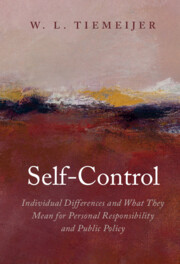 Self-Control
Self-Control Book contents
- Self-Control
- Self-Control
- Copyright page
- Dedication
- Epigraph
- Contents
- Figures
- Tables
- Acknowledgments
- 1 Introduction
- Part I Self-Control
- Part II Implications for Society and Politics
- 7 The Ever-Growing Importance of Self-Control
- 8 Self-Control and Moral Responsibility
- 9 Who Should Get What?
- 10 Conclusion: What Is to Be Done
- Notes
- Bibliography
- Index
9 - Who Should Get What?
from Part II - Implications for Society and Politics
Published online by Cambridge University Press: 20 August 2022
- Self-Control
- Self-Control
- Copyright page
- Dedication
- Epigraph
- Contents
- Figures
- Tables
- Acknowledgments
- 1 Introduction
- Part I Self-Control
- Part II Implications for Society and Politics
- 7 The Ever-Growing Importance of Self-Control
- 8 Self-Control and Moral Responsibility
- 9 Who Should Get What?
- 10 Conclusion: What Is to Be Done
- Notes
- Bibliography
- Index
Summary
This chapter focuses on the currently popular idea that the distribution of scarce goods such as income and social benefits should reflect differences in “deservingness” and track “responsible behavior.” In philosophy, this idea lies at the heart of what is sometimes referred to as “luck egalitarianism,” while in politics the idea translates into an ever-increasing emphasis on “personal responsibility.” I argue that the psychological findings on self-control raise serious problems for this approach to distributive justice. In fact, the problems are so intractable that they leave us little choice but to entirely abandon this approach in favor of an alternative – a combination of sufficientarianism and relational equality – that better fits the psychological findings previously discussed. Put differently, these findings more or less force us to revise our views on “who should get what.” Especially for the United Kingdom and the United States, this would imply a significant change in both ideology and practical policies.
Keywords
Information
- Type
- Chapter
- Information
- Self-ControlIndividual Differences and What They Mean for Personal Responsibility and Public Policy, pp. 215 - 237Publisher: Cambridge University PressPrint publication year: 2022